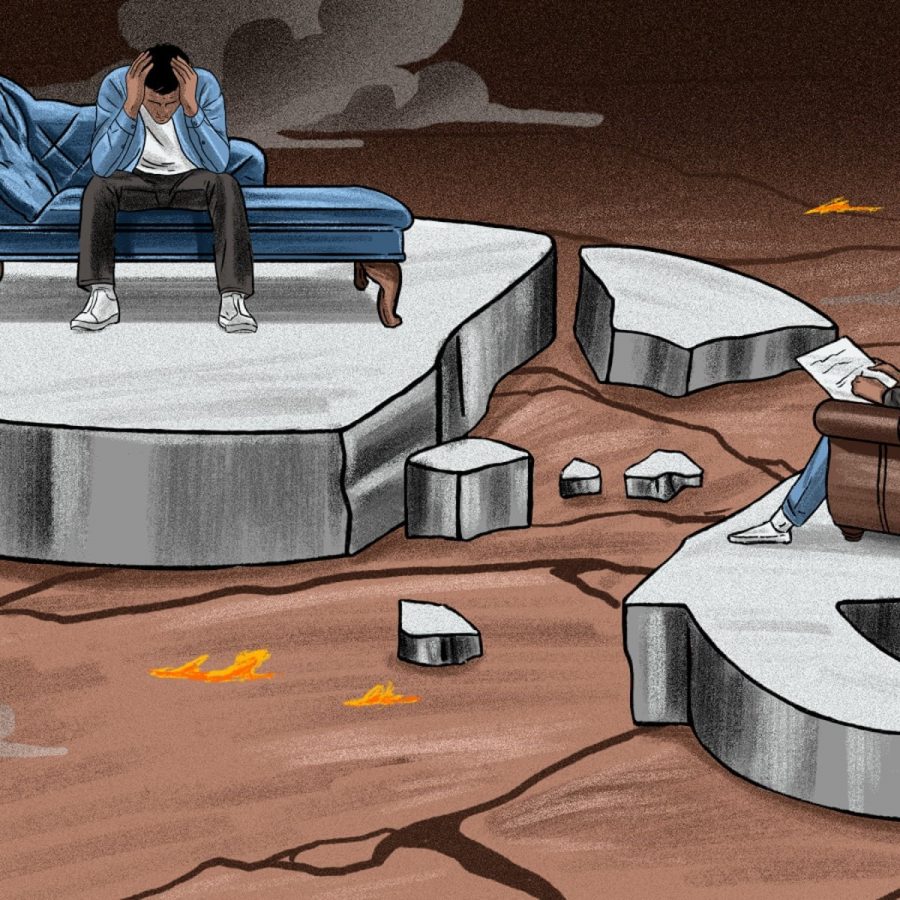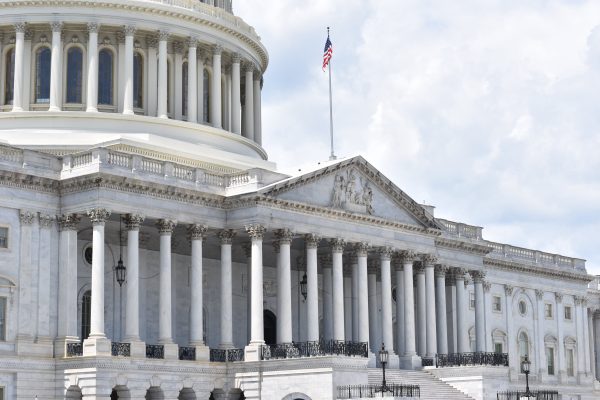Do You Experience Climate Anxiety?
November 29, 2021
Fall is my favorite season, it always has been. Each year, I look forward to the pumpkin flavored treats, and the rich scents which the season is notorious for. But what I most anticipate about fall is getting to watch the changing leaves. Always at the end of September, I admire the trees as they develop their vivid pigments, and then shed their leaves; watching the affair has always brought me a special sense of comfort. Yet this year, the leaves began to fall later than normal, the trees’ shedding spells were more sporadic, and they did not resemble their familiar melancholia bareness before our first snow hit. The comfort that this magical phenological process normally brings me, was replaced with worry. My favorite seasonal pastime was sabotaged by climate change.
This impediment is only one example of the many things that remind me of climate change on a daily basis. Shopping for clothes, picking out groceries, or even just spending time outdoors, I’ve found that the issue has become so ubiquitous, that I am reminded of it in almost everything that I do. I regularly hear about forest fires, melting ice caps, and rising temperatures on the news, and in conversations with friends. I am burdened with the knowledge that the Arctic Ocean is expected to become ice-free in summer before mid-century, and that more than one million species are at risk of extinction due to climate change (climate.nasa.gov). These ideas constantly invade my thoughts, and confessedly, account for a large portion of my worries.
Just recently, I learned that there is actually a term for these specific worries, climate anxiety. I struggle with the insecurity, frustration or worry caused by a warming atmosphere. Curious as to whether other Berkley students have similar worries, I decided to investigate. I took into consideration that climate anxiety is a subjective experience, but merely set out to determine if students felt any broad fear or anxiety about the effects, or notion, of climate change. To conduct my research, I used a list of the entire student body, and randomly chose six Berkley students to interview. I defined climate anxiety to them as apprehension or worry stemming from an awareness of climate change, and asked them if they had ever experienced it, and to rate the intensity of their feelings, among other related questions that corresponded to their answers. I here share with you all of their responses, as well as some related facts about climate change. The result, well, let’s just say, if you started off reading this article not knowing what climate anxiety was, you may very well experience it first hand by the end of it.
Of those who did not decline to be interviewed, I found that similarly to me, a couple of students claimed that they actively think about climate change throughout their everyday lives. Senior Mark Redman for one, claimed that he is broadly “fearful about the future of everything.” He cited the melting of ice caps, the loss of wildlife, the destabilization of tropical and floral environments and global warming, as the aspects of climate change that worry him the most. In his day to day life, the concept of mass production really unsettles him, and he finds himself thinking about it a few times throughout his week. “Looking at the food that people waste at restaurants, and that people don’t share similar concerns as me, or are indifferent (to climate change) frustrates me,” he said.
Upon hearing about Redman’s strong feelings towards food waste, it struck me that I had never considered if food waste had any environmental implications. In doing some research, I learned shocking truths about the process that not only justified Redman’s frustrations, but also incited my own. I was surprised to discover that food waste is actually one of the largest contributors to climate change. This is because methane gases are released when organic waste, such as food, is left in a landfill to decompose. Methane is a greenhouse gas which when released into the atmosphere, worsens climate change and global warming (www.sprep.org). Unfortunately, we accumulate about 35 million tons of food waste each year in America. And according to the United States Environmental Protection Agency, approximately 17.4% of all methane emissions are caused by landfills. I bet you that cow poop isn’t looking too bad to you right now. Well, I mean, um, you know what I mean… hopefully.
Likewise, senior Jordyn Wolf explained that she worries about “being able to accomplish life goals because of how fast the world is changing. She explained that it scares her to think about, “all of these climate crises that keep happening and what the world is going to look like in just five years.”
I can’t let the anxiety of the future completely control my life
— Jordyn Wolf
When I asked her to rate her climate anxiety on a scale of one to ten, she rated it as a seven. She reasoned, “I can’t let the anxiety of the future completely control my life,” but claimed that she still feels it’s important to be aware of what’s currently happening, and what our future may look like. Wolf finds herself worrying about climate change periodically throughout her week; she sometimes actively engages in the thought, but mostly, it just arises as a passing notion.
Conversely, senior Elliot Perkins claimed that climate change is not at the forefront of his worries, but explained, “when I start to think about the future of the planet, I definitely do (worry).” Perkins then expanded on this, saying that he thinks about it infrequently, “maybe once a week, or sometimes once every other week.”
When I asked him how his thoughts of climate change impact his perspective of the future, he said, “personally, I don’t think it does (impact it) which may be an irresponsible thing to think, but I know that even if irreversible impacts are done during my lifetime, I probably won’t see all of the effects that others will see in the future.”
Notably, many others expressed similar optimism during their interviews, though answers varied. When asked about whether or not they think climate change will improve in their lifetime, three students rated their optimism in the one to three range, while three others were in the six to eight range. When asked if anyone expects to see complete climate change reversal, only one answered in the affirmative. Unfortunately, the validity of this one person’s optimism is called into question by an important concept that Perkins mentioned in his interview: the idea of irreversible impacts.
The Intergovernmental Panel on Climate Change defines a state as “irreversible” if the time it takes a system to recover from a degenerated state, due to natural processes, is significantly longer than the time it took for the system to reach said degenerated state. Using that definition of irreversible, they deduced that most aspects of the climate change resulting from CO2 emissions are irreversible because of the long-spanning presence of irregular levels of CO2 in the atmosphere and the resulting atmospheric warming (researchmgt.monash.edu). Therefore, it is proven that some aspects of climate change, such as those that result from CO2 emissions, will never be reversed in our lifetime, let alone ever. However, this does not mean that climate change could not be improved in our lifetime, so there is hope yet. That is, if you’re a glass-half-full type of person.
Ossie Cierpial, a BHS junior, rated the intensity of his climate change anxiety as a seven. His reasoning was “because there’s a lot of rain, more than usual.” He said he does experience these apprehensive feelings quite often, specifically when he notices changes in weather, like increased rainfall, among other conditions.
Admittedly, I was slightly confused at the mention of increased rainfall. Like many others probably, I always associated climate change with global warming, and thought that it only caused increased durations of drought. However, after some exploration, I was surprised to learn that climate change also causes the atmosphere’s holding-capacity to increase, i.e. more water vapour in the atmosphere. And as Cierpial had noted, we actually experience this here in Michigan. A climate model featured in the latest Intergovernmental Panel on Climate Change report revealed that Michigan is projected to experience a 10-20% increase in precipitation over the next 80 years as a result of climate change (carbonbrief.org). So while you may have decades to prepare, the unfortunate news, and the potential cause of a worry-filled future for Cierpial, is that umbrellas and rain boots are certain to be more abundant in your future.
Interestingly, a slightly younger voice of our generation, freshman Sophie Novell, also shares similar experiences regarding concerns about climate change. She recounted that past trips to nature preserves had evoked apprehensive worries for her about the future of our planet, but that otherwise, she does not find herself thinking about those worries very often. She rated the intensity of her climate anxiety a four out of ten, and stated, “if climate change turns for the worst, it could affect my lifestyle or other peoples’ negatively.”
As Novell explained in her interview, she is sometimes sorrowful during her encounters with nature because of the premonition that it is fleeting, or at risk. Unfortunately, this notion is correct. According to National Geographic, we have lost about one billion acres of forest since 1990, and the Amazon Conservation Organization reports that in the year 2020, forest destruction increased by 21 percent, a loss approximately equal to the size of Israel. This deforestation severely worsens climate change because as plants grow, they absorb carbon dioxide from the atmosphere, but once they are cut down, that carbon dioxide is released back into the atmosphere. As a result, this process comprises about 8-10 percent of human’s annual carbon emissions. Anyway, hopefully Novell and the rest of us can sleep soundly at night knowing that at least we’ll always have state parks. Yosemite has got to count as some sort of consolation, right?
However, some people, like junior Nico Brozetti, don’t experience climate anxiety as severely. When asked to rate the intensity of his climate anxiety, Brozetti scored it a two on the one to ten scale. He stated, “I’ve thought about it (climate change), but I’m never really anxious about it.” Nevertheless, similar to Myself and Cierpial, Brozetti admitted that noticeable changes in weather conditions sometimes spark his concern. He stated, “looking outside, sometimes if there’s not a lot of snow, it reminds me of climate change.” Despite this, he claims to have never considered how climate change may affect his future.
Overall, the general trend among students was that we are thinking about climate change. Whether you’re an emotional nervous wreck because of it, or just conscious of its existence, climate change seems to play into a majority of students’ worries. However, these worries are not in vain, and for many of the students I interviewed, their cognizance has already inspired them to engage positively and productively with our environment.
For instance, Redman plans to go into the energy industry in his future, and do research and development for mechanisms that will create more clean energy sources. His aspirations are inspired by his recognition that “the energy industry has a very large impact on climate change.” In the meantime, Redman currently carpools to preserve energy, and tries to pick up any trash that he finds on the ground in an effort to reduce pollution. He views these minor tasks as “very easy things to do.” He then added, “they’re thoughtless, and don’t require much energy.”
However these small feats, which Redman regards as simple acts, actually have the power to make a huge difference in enacting positive change for the environment. A study by Jacobson and King (2009) estimated that if one additional passenger was added to every 10 vehicles, we could potentially save 7.54 to 7.74 billion gallons of fuel per year in the U.S., annually. Another study revealed that we could save 33 million gallons of gasoline daily, if each commuting vehicle carried an additional passenger (escholarship.org). These findings suggest that the gasoline reduction caused by carpooling could decrease our CO2 emissions astronomically, a vital step for reducing climate change.
I try to reduce waste, and try to recycle as much as I can, and reuse boxes and packages, and not throw out plastic items.
— Elliot Perkins
Perkins on the other hand said, “I try to reduce waste, and try to recycle as much as I can, and reuse boxes and packages, and not throw out plastic items.”
Although you may feel like you hear it enough, recycling is an easy and effective way to reduce your carbon footprint. It can reduce emissions of carbon dioxide, methane nitrous oxide and chlorofluorocarbons which are all greenhouse gases, and heavily contribute to worsening global warming (lbre.stanford.edu). If everyone were to take after Perkins and do their fair share of recycling, we could save over 193 million metric tons of carbon dioxide each year, the equivalent of the reductions that would be caused by taking almost 42 million cars off of the road for a year (www.epa.gov). For specific information about how to recycle in your area, visit https://how2recycle.info/check-locally.
Wolf also implements pragmatic habits to help to save our planet. She stated, “I am actively trying to become aware about my carbon footprint because I watch a lot of documentaries and read the news about climate change. I focus on simple acts like recycling, and avoiding fast fashion, I really have decreased my support of those businesses. I shop second-hand and try not to use single-use plastics because now I know that what I do is harmful in some way, so it’s just important to be aware.” She explained that she finds her awareness about climate change empowering because it motivates her to try and help out in any ways that she can.
Wolf is right, knowledge is power, and in a world of technology, where information is easily accessible for most, educating yourself about climate change is an easy, and valuable place to start. To learn more about the sustainable fashion industry that Wolf was referring to, you can read my previous article The Rise of Sustainable Fashion, or visit the site https://goodonyou.eco/ to start your search for sustainable clothing brands. You can also read The Importance of Reducing a Carbon Footprint by Sciencing.com, or How to Reduce Your Carbon Footprint by the New York Times, to learn more about how you may be contributing tp climate change, and to find ways that you can help to reduce your carbon footprint.
Despite the potentially cynical tone of this experiment, I truly think that the lesson to be had is that, in a world where we may be surrounded by bad news about the climate, we can use our evoked worries in a productive way, or as empowerment, as Wolf suggested. That way, you can reduce your climate anxieties through trying to create a future world where your kids won’t have to have any.













